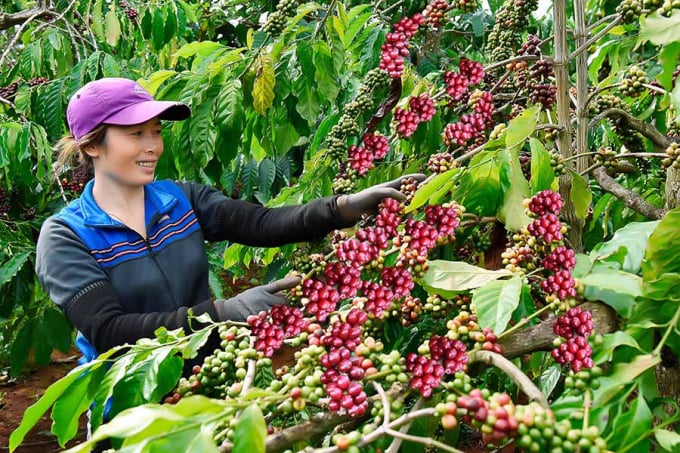November 21, 2025 | 06:33 GMT +7
November 21, 2025 | 06:33 GMT +7
Hotline: 0913.378.918
November 21, 2025 | 06:33 GMT +7
Hotline: 0913.378.918

Nescafé Plan has coached and trained more than 260,000 farmers.
Sustainable development is now the trend of Vietnam's coffee industry. Since the Vietnamese coffee industry is gradually growing, the requirements of foreign customers are consequently increasing, especially the requirements for sustainable coffee, for the process of growing, harvesting, processing, and preserving that ensure food safety standards, for traceability.
Many businesses, particularly large enterprises in the coffee industry, are stepping up the implementation of sustainable development programs.
Intimex Group, the largest coffee exporter in Vietnam, is one of the pioneers to participate in the sustainable development trend by collaborating with international organizations to implement sustainable coffee programs such as UTZ, 4C... in key material areas such as Gia Lai, Dak Lak, Lam Dong, Dak Nong.
In 2020, despite being affected by the Covid-19 epidemic, Intimex Group still start a sustainable project in Gia Lai with a budget of US$ 300,000 and a 200,000 euros project in Ban Me Thuot.
This year, Intimex Group will deploy a sustainable project with a budget of 300 thousand euros in Di Linh (Lam Dong). Intimex supports 30% of the funding in those projects, the remaining 70% will be from international organizations. All these projects are located on satellites by international organizations for close management.
According to Mr. Ngo Xuan Nam, Deputy General Director of Intimex Group, sustainable projects implemented continuously over the years have helped them make a difference for the Group's coffee products. As a result, Intimex Group's position is increasingly enhanced in the coffee market.

A coffee garden produced under 4C certificate in Gia Lai
Nestlé Vietnam is also a leading company in sustainable development through the NESCAFÉ Plan project, which has been implemented since 2011 in the 4 Central Highlands provinces of Dak Lak, Dak Nong, Lam Dong and Gia Lai.
By 2020, the Nescafé Plan program has distributed over 46 million disease-resistant coffee seedlings to farmers, renovating and replanting 46,000 hectares of aging coffee. At the same time, the program helps farmers build a management tool "Farmer's Diary" based on digital technology to connect more closely between farmers and experts, thereby helping farmers manage production and business activities effectively, replacing paper management.
Nescafé Plan has coached and trained more than 260,000 farmers on sustainable farming techniques. As a consequence, it helps to save 40% of irrigation water, reduce 20% of the chemical fertilizers and pesticides amount (thanks to the composting of coffee bean husks as organic fertilizer instead of chemical fertilizers) at coffee gardens participating in sustainable production.
More than 21,000 households joining Nescafé Plan have achieved 4C international coffee certification. With the application of this certificate, the income of coffee farmers has increased by 30%.
As claimed by Mr. Binu Jacob, General Director of Nestlé Vietnam, Nescafé Plan has been deployed by Nestlé Group (Switzerland) in 10 countries since 2010 under the public-private partnership (PPP) model, only in Vietnam one year later.
Despite being late, Nescafé Plan in Vietnam has become a typical model of the global Nescafe Plan and has positively impacted the development of sustainable coffee in the country, contributing to improving the value of Vietnamese coffee beans on the market.
Translated by Samuel Pham

(VAN) The information was shared at the seminar 'Urban Agriculture - Solutions for Developing Green Spaces,' organized by the Kinh te & Do thi Newspaper and the Biotechnology Center of Ho Chi Minh City.
/2025/11/19/4141-2-132831_216.jpg)
(VAN) One of Japfa's outstanding solutions is implementing digital transformation and artificial intelligence (AI) to optimize operations, enhance productivity, and advance sustainable development.
/2025/11/19/4847-1-093540_448.jpg)
(VAN) The Gia Lai Provincial People’s Committee had a working session with the delegation of the U.S. Department of Agriculture, the State of Idaho, and representatives of the State's leading enterprises.

(VAN) Ca Mau has a sufficient foundation to become a strong regional aquaculture center, where production integrates the economy, the environment, and the lives of the people.

(VAN) SEIKI Group envisions itself as a pioneer in the ‘dual transformation’ of digital technology and green industry, standing alongside the Government and Vietnamese businesses in their pursuit of sustainable development.

(VAN) The VNGEONET network affirms Viet Nam's progress in mastering digital space, providing a precise positioning data platform to serve socioeconomic development.
/2025/11/14/3247-1-184556_35.jpg)
(VAN) Thai Nguyen is methodically implementing digital transformation in the livestock sector, laying the foundation for a modern, transparent, and sustainable agriculture.